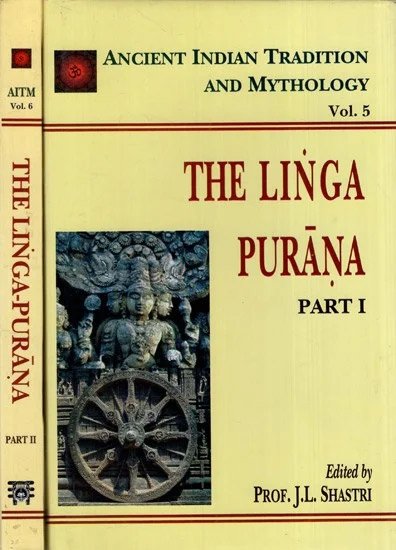The Linga Purana
by J. L. Shastri | 1951 | 265,005 words | ISBN-10: 812080340X | ISBN-13: 9788120803404
This page describes Hymn to Lord Shiva which is chapter 32 of the English translation of the Linga Purana, traditionally authored by Vyasa in roughly 11,000 Sanskrit verses. It deals with Shaiva pilosophy, the Linga (symbol of Shiva), Cosmology, Yugas, Manvantaras, Creation theories, mythology, Astronomy, Yoga, Geography, Sacred pilgrimage guides (i.e., Tirthas) and Ethics. The Lingapurana is an important text in Shaivism but also contains stories on Vishnu and Brahma.
Chapter 32 - Hymn to Lord Śiva
The sages said:
1. Obeisance to the lord who is naked,[1] who bears the trident, who dissolves the universe,[2] who is handsome,[3] who is an axe to the tree of the universe,[4] to one with terrifying face.[5]
2. Obeisance to formless one; to one of handome form; to one of the form of the universe. Obeisance to one who embraces the elephantine face of his son Gaṇeśa;[6] obeisance to Rudra; obeisance to one in the form of yajamāna?[7]
3. Obeisance to one bowed by all; obeisance to one who bows to his own Ātman; obeisance to one with blue tuft;[8] obeisance to one with poison in his neck.
4. Obeisance to one who is blue-necked, to one who applies the ash from the cremation ground all over the body. You are Brahmā among all Devas. You are Nīlalohita among all Rudras.
5-6. You are the soul of all living beings. You are known as Puruṣa in the Sāṅkhya system. You are Meru among mountains; moon among planets; Vasiṣṭha among sages; Indra among Devas; Om among Vedas and the excellent Sāman among Sāman verses.
7. You are lion among beasts; bull among animals and lord of all men.
8. In whatever form you are, whatever form you may assume, may we be able to see you there in the manner mentioned by Brahmā.[9]
9. Lust, anger, covetousness, despondency and arrogance—we wish to know all these; be pleased, O supreme lord.
10. When the time of great Dissolution arrived, O lord, the hand was rubbed against the forehead and fire was generated by you the self-possessed soul.
11. Then the whole world was enveloped by that fire. Hence these (lust, anger etc.) are distorted fires equal to the fire of dissolution.
12-16. Lust, fury, greediness, delusion, arrogance and harassment and all living beings mobile and immobile are burned by the fire originating from you. O lord of Devas, be our protector even as we are being burned. O highly blessed one, O supreme lord, for the welfare of the world you sprinkle the living beings. O auspicious observer, O lord, command us: we shall carry out your behest, in thousands and crores of living beings, in hundreds and crores of forms, we are unable to reach the extremities. O lord of Devas, obeisance be to you.
Footnotes and references:
[1]:
digvāsas [digvāsase]—aparichinnarūpāya Śivatoṣiṇī.—not conditioned by limit.
[5]:
karālavadana [karāla-vadanāya]—of terrible face.
[6]:
kaṭaṅkaṭa [kaṭaṅkaṭāya]—who one touches lovingly the elephantine face of Gaṇeśa.
